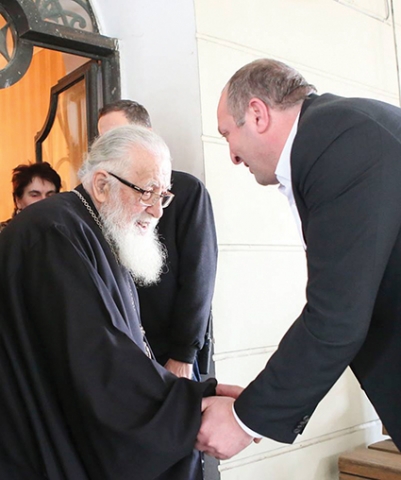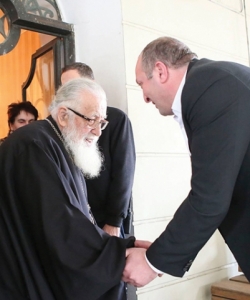Patriarch of Georgia Refused Right to Pardon Prisoners?
Last week, Georgia’s Catholicos Patriarch Ilia II released a claim that the Patriarch should have the right to pardon prisoners.
After attending a play staged by prisoners at Rustaveli Threatre, Ilia II declared that from his point of view, the Patriarch should have the right to pardon prisoners and inmates. “We have discussed the issue with the Prime Minister and he will supposedly raise it,” Ilia II stated.
Following the statement, Georgian PM Irakli Garibashvili said that the Catholicos-Patriarch is the spiritual leader of the Georgian nation and his advice is important and valuable for the people.
The PM expressed his belief that increasing the Patriarch’s inclusion in the pardon process could be positive. “Therefore, the head of the government calls on the President and Parliament to consider the issue,” the government’s press service said.
Georgia’s Minister of Corrections, Kakha Kakhishvili, also supported the notion. “He is the leader of the nation. I don’t know any person wiser than him. Therefore, he should really have the right to pardon,” Kakhishvili stated.
Justice Minister Tea Tsulukiani, on the contrary, commented that giving the Patriarch such a right would go against the Constitution of Georgia, violating the principle of state and church separation. She added that if the Patriarch feels many prisoners deserve to be pardoned, he should make recommendations to the President in this regard.
Irakli Alasania, leader of the Free Democrats opposition party, stated that the government and the state have their own functions and obligations, as does the Church.
The issue was declared closed after the President of Georgia Giorgi Margvelashvili visited Catholicos-Patriarch Ilia II on December 3rd.
Following the visit, the President declared his love and respect for the Patriarch. “I would like to emphasize that it is everyone’s duty, especially that of politicians, to take care of this most important person for our country.”
A meeting was held following the statement where some Georgian MPs and representatives of the cabinet argued in favor of granting the Patriarch the right to pardon prisoners.
The President declared on Kavkasia TV that this is not the first time these fundamental issues have been raised.
He said, “the issue is clear and does not need further clarification.”
According to the President, the issue has been closed as a result of the “active engagement of civil society and very clear statement of the Church.”
A number of significant details of the President-Patriarch meeting have not been disclosed and it is doubtful whether they will be following the President’s ‘closure’ of the matter. The President further declared after the meeting that some politicians revealed their lack of a basic understanding of the details of Georgia’s statehood and the Georgian Constitution when they supported the debated notion.
Back in 2002, a Constitutional Agreement was signed by the Church and the President which specified the separation of functions of the State and the Church. The Agreement incorporates a secular state, where religion stands apart from the political processes and an agreement whereby the two institutions do not intervene in one another’s affairs.
Steven Jones












